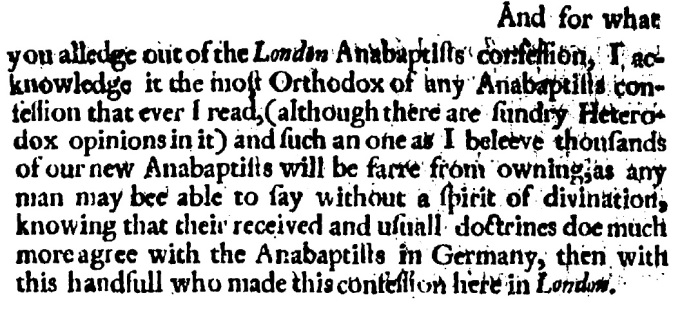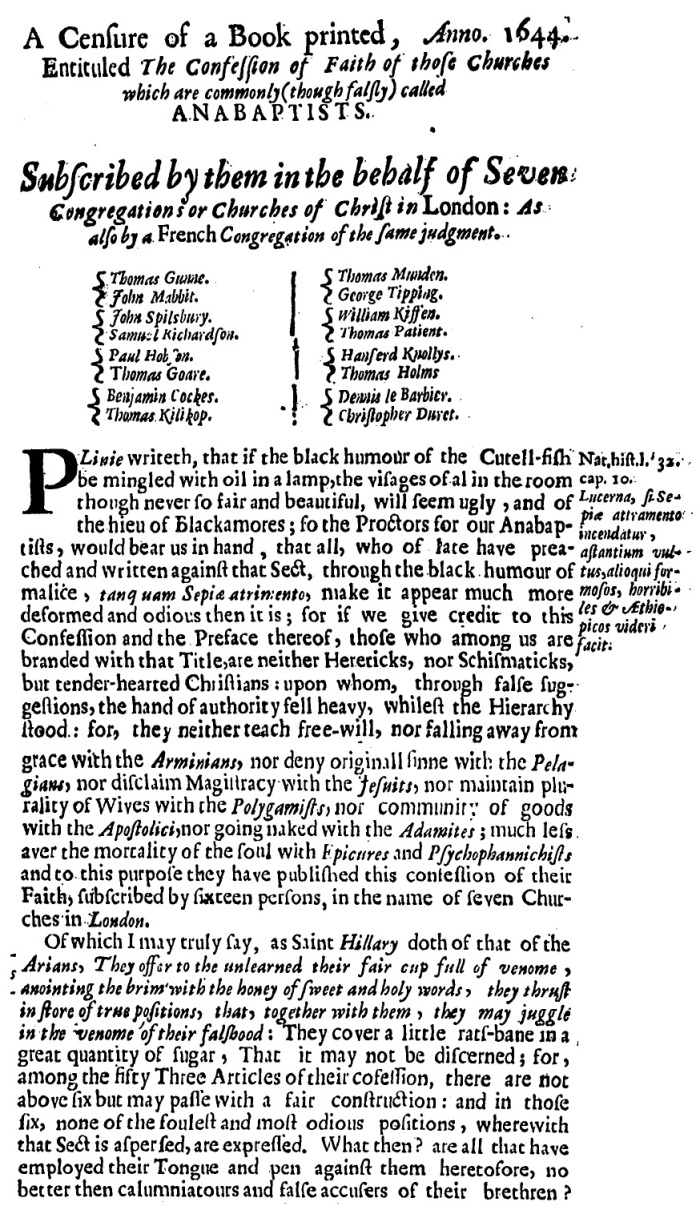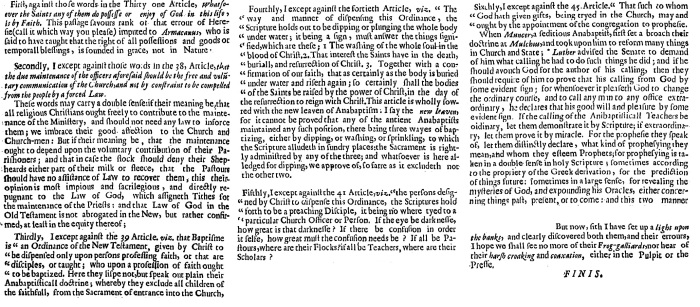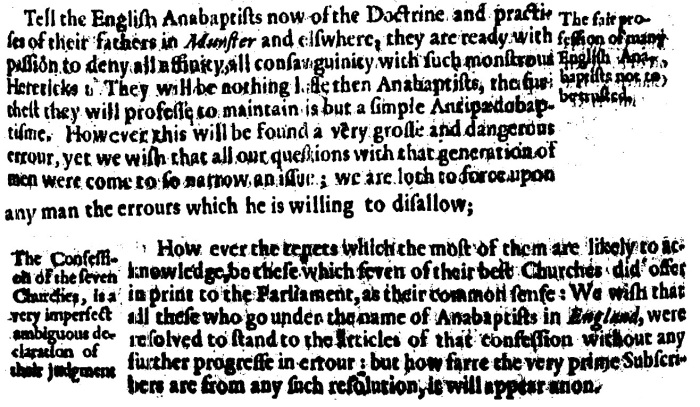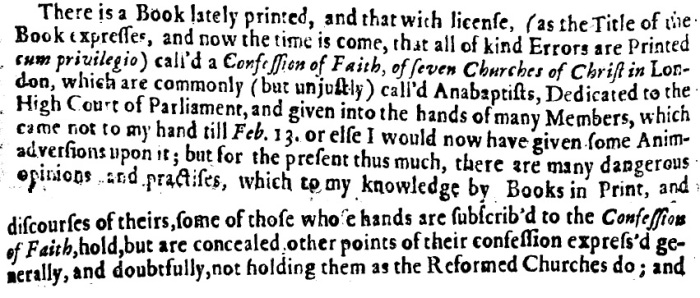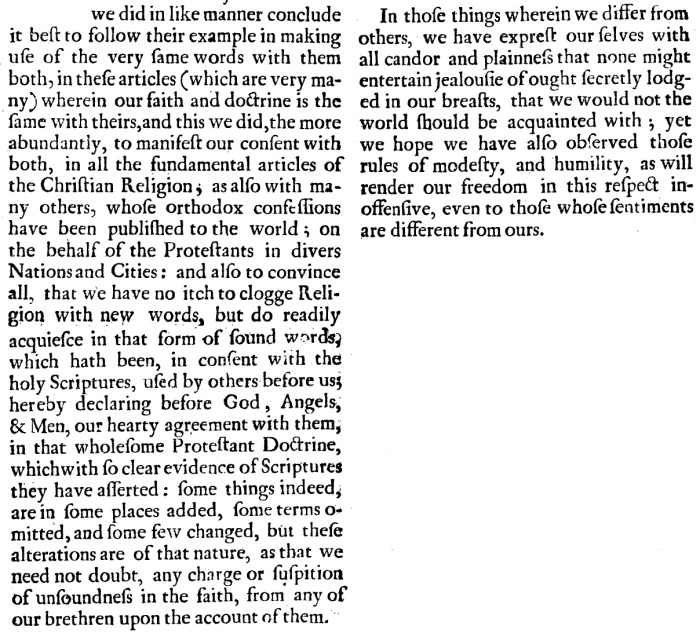When contending that Reformed theology, in the context of early seventeenth-century Puritanism, is the most significant influence on Particular Baptist origins and theology, this question naturally arises: If the Particular Baptists were so similar to the Reformed tradition, why is it that those in the Reformed tradition viewed the early Particular Baptists as something so different?
Given that the Particular Baptists emerged just before and during the time of the Westminster Assembly, how did the Westminster divines view the Particular Baptists and what did they say about them? To answer these questions, we need to ensure that we understand as much as possible the context in which the Westminster divines were introduced to, and responded to, the Particular Baptists.
Particular Baptists Through Presbyterian Lenses
If you were a Presbyterian divine in the Westminster Assembly commissioned by the government (Parliament) to establish a government-backed national uniformity of religion, what would a Particular Baptist look like to you in the early 1640s? You would likely not know what a Particular Baptist was, at least not clearly. But several of their tenets would be highly repulsive. How so? Consider the following from the perspective of a Westminster divine:
First, you believe that in matters of religion, the civil magistrate has the right to compel the conscience.
They who upon pretense of Christian liberty, shall oppose any lawful power…whether it be civil or ecclesiastical, resist the ordinance of God. (WCF 20.4)
And, for their publishing of such opinions, or maintaining such practices, as are contrary…to the known principles of Christianity…they may lawfully be called to account, and proceeded against by the censures of the church, and by the power of the civil magistrate. (WCF 20.4)
Second, you believe that the civil magistrate is responsible to enable the true church to exist and to disable all opposition.
It is [the civil magistrate’s] duty to take order that unity and peace be preserved in the church, that the truth of God be kept pure, and entire; that all blasphemies and heresies be suppressed; all corruptions and abuses in worship and discipline prevented, or reformed; and all the ordinances of God duly settled, administered, and observed. (WCF 23.3)
Third, you believe that this national uniform church should include a form of hierarchical government.
Fourth, you have been commissioned by Parliament to begin this process.
A Particular Baptist (though you would not know him by that name) believes that the conscience cannot be forced in matters of religion, that the civil magistrate has no right whatsoever to establish, enable, or enforce a national church, and that all authority and power for the government of churches resides in the churches themselves, subject to no higher power as a church power. If the Particular Baptist is right about this, the Westminster Assembly’s very existence and purpose are invalidated.
If this were not enough, there are some in England who are apparently baptizing themselves, forming their own congregations, ordaining their own officers, and publishing literature advocating their positions while criticizing yours on these points. Their existence is antithetical to yours, to the church you envision, and to the mission your government has given to you. And now, some of the university men and clergy are joining them! This Anabaptism must be stopped.
The Westminster Assembly sent a recommendation to Parliament in Aug-Sep of 1644 advising legislation for the suppression of Anabaptism. The Assembly sent out a call for Anabaptists to submit their reasons against infant baptism to the Assembly. The next month, October, the Particular Baptists published their first Confession of Faith.
If you were one of those divines and you received a copy of the Baptists’ Confession, what would you think? The title of this Confession of Faith oddly claims that they are called Anabaptists falsely. And they, the falsely-called Anabaptists, address the Confession not only to their countrymen, but also to “those that think themselves much wronged, if they be not looked upon as the chief Worthies of the Church of God, and Watchmen of the City.”
So, apparently a group of Anabaptists that say that they are not Anabaptists, but also don’t mind telling us (the Westminster Assembly) that we are somewhat conceited, have published a Confession of Faith. What do they believe? Who are these people? Listen to the divines responding to the 1644 1LCF.
Stephen Marshall said,
I acknowledge it the most Orthodox of any Anabaptists confession that ever I read, (although there are sundry Heterodox opinions in it) and such an one as I believe thousands of our new Anabaptists will be far from owning.
So, in Stephen Marshall’s opinion most Anabaptists would never come close to calling this confession their own. To the contrary, it’s the most orthodox Baptist theology he’s read. But it has unorthodox opinions.
Robert Baillie said,
Tell the English Anabaptists now of the Doctrine and practice of their fathers in Munster and elsewhere, they are ready with passion to deny all affinity, all consanguinity with such monstrous Heretics…the furthest they will profess to maintain is but a simple antipaedobaptism…We wish that all our questions with that generation of men were come to so narrow an issue; we are [reluctant] to force upon any man the errors which he is willing to disallow.
We wish that all these who go under the name of Anabaptists in England, were resolved to stand to the Articles of that confession without any further progress in error.
In Baillie’s mind, the only connection to the Anabaptists that the Baptists of this Confession will acknowledge is that they both reject paedobaptism. And he wishes that the scope of their disagreement was so limited with all Baptists.
When credobaptism is placed within the context of 1640s England, one can appreciate the dilemma to which Baillie alludes. He says that they do not wish to attribute errors to those who deny them. He is looking at a Baptist confession full of Reformed theology, and yet coming from a group whose distinctives are antithetical to a Westminster Presbyterian. If they say that they aren’t Anabaptists, but they’re opposite to Presbyterians in key ways, what are they? It was easy to continue calling them Anabaptists. It was a lazy label, even a label that Marshall and Baillie acknowledged didn’t quite fit, but ultimately it was a convenient label for use by a government-backed ecclesiastical structure because it created instant marginalization and exclusion.
The Difficulties and Oddities of the Discussion in a Modern Context
We have seen several contextual historical and theological reasons for why the 1640s Presbyterians viewed the Particular Baptists as so different from themselves. What we must be careful to do is to read the Presbyterian reception of Particular Baptists through their own lenses. But the difficulty is that modern Presbyterians are so different today. Few of them hold the original views on liberty/compulsion of conscience and the role of the civil magistrate in the same.
Consequently, when you put the modern inheritors of WCF with the modern inheritors of 1LCF (who now confess 2LCF, 1677), several of the key pieces of Particular Baptist theology that were considered so dangerous and repugnant to the Presbyterians of the 1640s are now codified elements of revisions of the Westminster Confession itself. We could add to this the fact that though Presbyterians today still reject congregationalism, it must be perfectly acceptable within Reformed theology because everyone gives Owen and the Dissenting Brethren a pass into the “Reformed” world. The differences in doctrine between modern Particular Baptists and Presbyterians are therefore significantly narrowed by the Presbyterians’ confessional moves closer to the Baptists. The Baptists have not changed their confession since its original composition in 1677.*
Ironically, this means that many modern Presbyterians are at odds with key features of their own tradition because as noted above, if the state cannot and should not establish national religion, the Westminster Assembly should never have been called for the purpose that it was called. Strangely, the American Westminster Confession essentially invalidates the reasons for the existence of the original Westminster Confession.
Conclusion
In conclusion, the purpose of this post was to address the question: If the Particular Baptists were so similar to the Reformed tradition, why is it that those in the Reformed tradition viewed the early Particular Baptists as something so different?
We have seen Westminster divines remarking on the orthodoxy of 1LCF. We have also seen them dismissing it in the context of a uniform national state church which is utterly opposed to Baptist congregationalism. And we have noted that appropriating 1640s responses to the Particular Baptists in a modern context is strange and difficult given that the premises of the 1640s Presbyterians’ criticisms are no longer shared by modern Presbyterians. This should caution us all to make sure we understand the contextual motivation and argumentation of older sources, especially if we want to apply those sources to modern contexts.

*Meaning not that there has never been an edited version of 2LCF, but that its modern inheritors confess it in its pristine originality.

